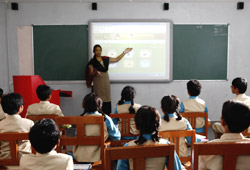Curriculum
Academic Curriculum
Objectives
Classes IV and V: Opening their minds to new vistas:

The training process begins at the age of 7, when teaching forms strong inner images in the child's mind along with working on the various forms of his/her active artistic creativity.
To facilitate this, class room learning is made enjoyable with multiplication tables learnt with the help of rhythmic walking and skipping; while nature is studied through characteristic gestures and movements of plants and animals. Children learn by imitating everything and everybody.
Smart Classrooms:
Classroom learning is supplemented by impressive 'live and media' observations. Beautiful and powerful images of multi-media presentations navigate the child's mind through a world of fantasy. A smart classroom with plasma television and latest systems connected to a centralized server and supported by able technical staff, an internet access and more than 25000 educational CDs – apart from an Audio-Visual lab with various types of projection facilities, educational video cassettes and satellite television – aid the teaching methodology at Abhyasa.
Lessons appeal to emotions and the child is trained to feel what is learnt – outward acceptance of ideas without inwardly feeling their significance may lead to emotional or even social disturbances in future, when individuals are not trained to filter their thoughts Most successful business and political leaders have often relied on EI to perceive solutions to problems which the logical mind failed to solve. Such perception, known as intuitive insight consolidates much later after the student leaves school. But seeds for the same are sown during childhood…and Abhyasa is fully geared to develop 'complete individuals' by fostering and integrating various types of intelligence. Therefore individuals need to develop two minds – One that thinks and the other that feels.
Thoughts and Feelings are powerful partners which will enable children shape their new world!
Classes VI, VII & VIII: Solving their problems through creative thinking:
Psychological studies reveal that: Individuals remember 10% of what they hear, 20% of what they see, 40% of what they talk or discuss and 90% of what they 'do'!
During the second stage, stress is laid on 'doing'. The hand is trained to be skillful and the eye is schooled to observe relationships and measurements. The earlier play-way method paves way for an experiential approach, where the child actually encounters the concepts or phenomena and acquires abilities to work with materials and specimens. Learning becomes meaningful through group discussions and 'theatre' in classroom. Students undertake 'live observations' and undergo a 'hands-on-experience' through ploughing, sowing, harvesting in their natural environs and develop abilities that stem out of such activities.
The school has full-fledged laboratories for physics, chemistry and biology subjects – where students experiment right from class 6. Teachers follow the students' interests, inspire originality, accept their ideas and are always available to help them learn from their mistakes.
The inter relationships between actions and objects provide a conceptual comprehension, followed by recall, reflection and imagination which strengthen the child's memory. The encounters with natural phenomena leave a lasting impression and as students pass out of middle school, they gain abilities of skillful observation, intelligent comprehension, active recollection and creative imagination.
Classes IX, X, XI and XII: Developing their emotional intelligence:
The intellect comes into play when the student passes through adolescence. The individual travels from polarity to contrast, from analysis to synthesis and so on. Various concepts which were earlier 'analysed to understand' are now 'synthesized to draw conclusions'. At this stage, the student is challenged to work independently to cultivate skills of individual judgment through research, dissertations, projects, seminars and viva presentations. This is the culmination of all thinking processes. The teacher's metamorphosis from an 'authority with love' to an 'experienced friend'. They are involved in the students' learning process and intensely interested in everything that the teenager is curious about – such as problems of the times and life.
While concepts and logic constitute the thinking mind, feelings and emotions recorded in the child's subconscious, constitute the emotional intelligence (EI). EI is an expansion of the intellect and guides the thinking mind where to look next through language of feeling and mental images.
Most successful business and political leaders have often relied on EI to perceive solutions to problems which the logical mind failed to solve. Such perception, known as intuitive insight consolidates much later after the student leaves school. But seeds for the same are sown during childhood…and Abhyasa is fully geared to develop 'complete individuals' by fostering and integrating various types of intelligence.